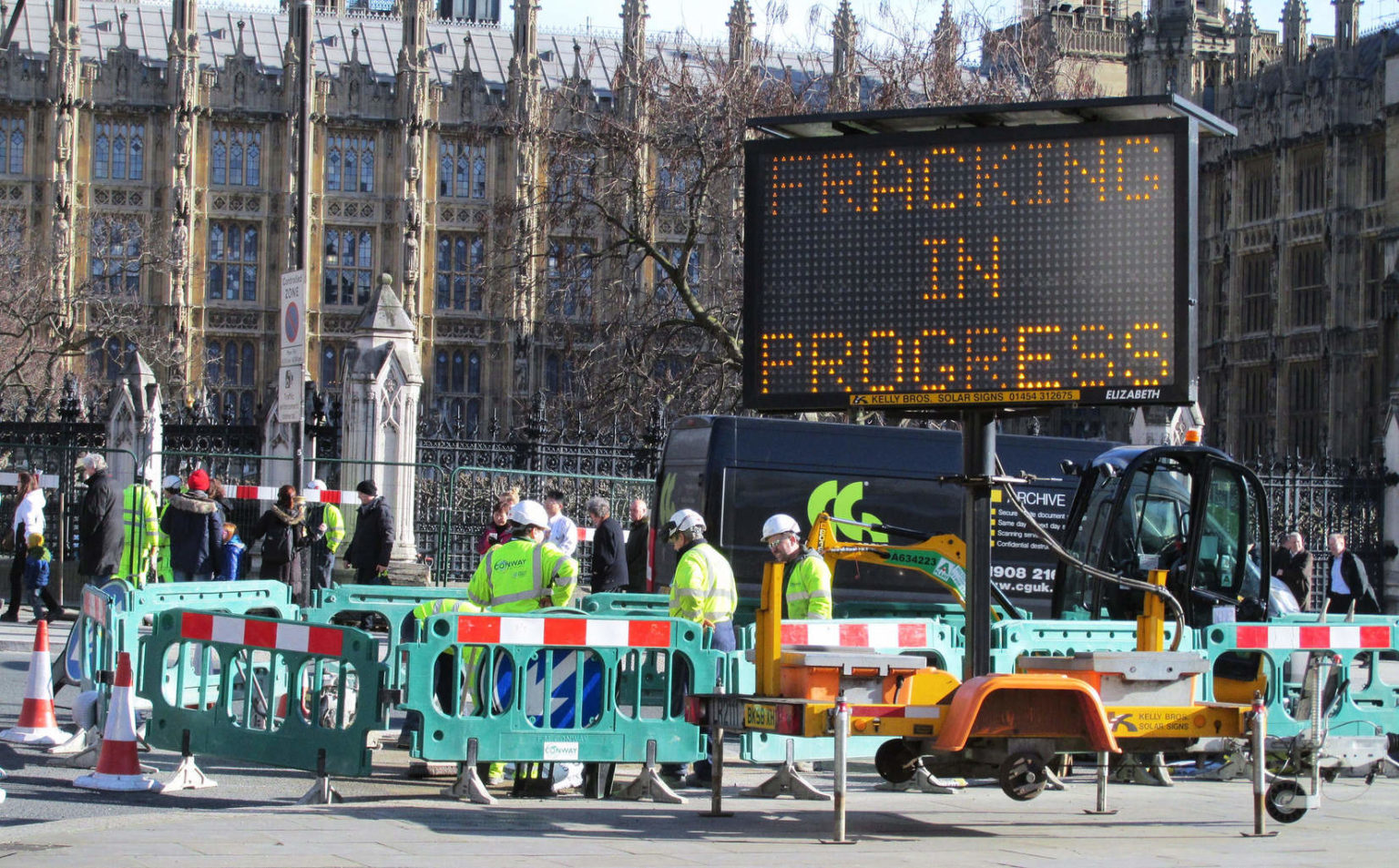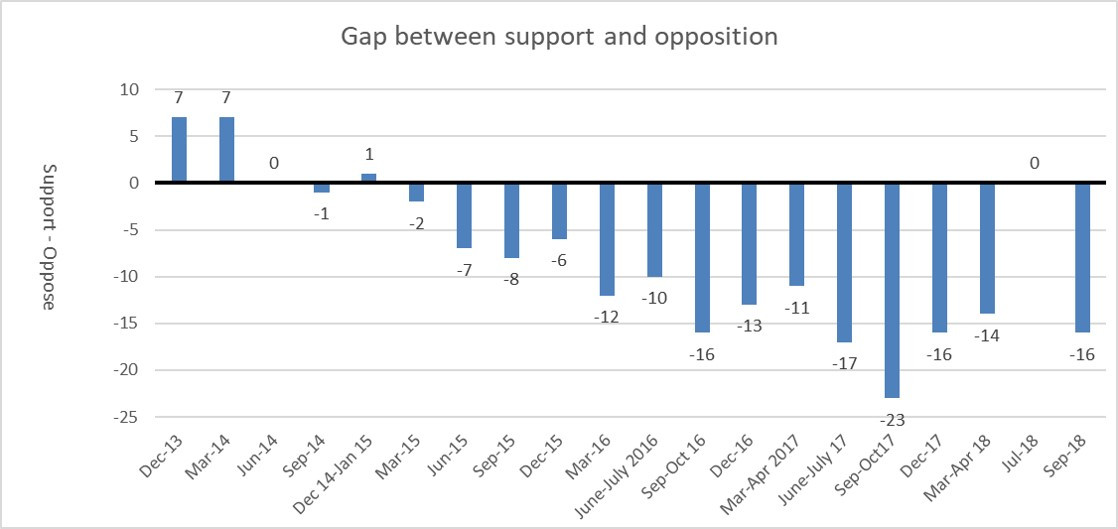By Ruth Hayhurst, Drill or Drop
The government has resumed its quarterly survey of public attitudes to fracking and shale gas. The latest results, published this morning, show support for fracking stands at 15 percent, down 3 percentage points, and opposition at 31 percent, down 1 point.
The previous Wave tracker survey, published in August 2018, dropped questions, for the first time since 2013, on whether people supported or opposed fracking.
At the time, the Department for Business, Energy and Industrial Strategy (BEIS) said the questions would be asked only annually in future to allow space for “more focused questions” on subjects, such as consumer issues or employment rights.
But BEIS explained last week why the questions were returning:
“With the UK entering a new era of shale gas exploration it is only right that we routinely gauge the opinion of the British public and so the questions on supporting/opposing shale gas development will return to each quarter of the tracker.”
The fieldwork for today’s results was carried out before a series of earth tremors linked to Cuadrilla’s fracking at Preston New Road near Blackpool.
Support
15 percent of those surveyed said they supported fracking, the second lowest level recorded since the question was first asked nearly five years ago.
The latest figure was down 3 percentage points on the result for March-April 2018 when the question was most recently asked. It was up on the record low of 13 percent a year ago. Strong support for fracking remained unchanged at 2 percent.
The gap between support and opposition has returned to the level last seen in summer and winter 2017.
BEIS said men were more likely to support fracking than women: 20 percent compared with 10 percent. Other groups more likely to support fracking were:
People aged 65 and over (20 percent) compared with people aged 16-24 (11 percent).
People with household incomes of £50,000 (21 percent) compared with people with household incomes up to £16,000 (15 percent).
People living in the East Midlands (21 percent) compared with people living in Northern Ireland (6 percent).
The most common reasons to support fracking were:
- The need to use all available energy sources (36 percent)
- Reduce dependence on other fossil fuels (25 percent, down from 31 percent)
- Good for local jobs and investment (23 percent, up from 19 percent)
- Reduce dependence on other countries for energy (23 percent, down from 36 percent)
- Cheaper energy bills (17 percent, down from 26 percent)
Community benefits and the shale wealth fund were among the least common reasons to support fracking (4 percent and 1 percent).
Opposition
31 percent of participants opposed fracking.
This was down 1 percentage point on March-April 2018 when the question was most recently asked and down from the record high of 36 percent a year ago. But opposition to fracking has remained about 30 percent since March 2016.
Strong opposition was down 1 percentage point to 12 percent.
The survey found that people in social grade AB were more likely to oppose fracking than people in social grade DE: 39 percent compared with 25 percent.
Geographically, the people most likely to oppose fracking, according to the survey, were those living in Wales(41 percent), the North West (38 percent) and Scotland (36 percent).
People who said they knew a lot about fracking were more likely to oppose than support (58 percent compared 24 percent).
The most common reason for opposing fracking were:
- Loss or destruction of natural environment (58 percent, up from 57 percent)
- Not a safe process (27 percent, down from 29 percent)
- Risk of earthquakes (26 percent, down from 29 percent)
- Too much risk and uncertainty (25 percent, down from 28 percent)
- Risk of contamination to water supplies (25 percent down from 31 percent)
Neither support nor oppose
Half those surveyed said they neither supported nor opposed fracking, the highest recorded by the survey so far. This was up slightly on the 47 percent when the question was most recently asked (March-April 2018).
The main reason for neither support nor opposing fracking was a lack of knowledge about it (77 percent).
4 percent said they did not know whether they supported nor opposed, unchanged on the survey when this was last asked.
Awareness
75 percent of people said they were aware of fracking. This is down slightly on the 78 percent recorded in the most recent survey and in September 2017.
11 percent said they knew a lot about fracking, 45 percent said they knew a little and 19 percent were aware but did not really know what it was. 25 percent said they had never heard of fracking.
BEIS said the awareness was higher among people aged 65 and above (86 percent) than in 16-24 year olds (56 percent). It was also higher among people in social grade AB (87 percent) than among people in social grade DE (61 percent).
Awareness was also higher among people with household incomes of £50,000 and over (89 percent, compared with 70 percent among people with household incomes up to £16,000).
People living in the north west and Wales had higher level of awareness (83 percent) and those living in London (56 percent).
A spokesman for Frack Free Lancashire said:
“The widening gap between opposition and support is hardly surprising and neither is the fact that more than twice as many oppose shale gas as support it.
“This polling clearly shows that acceptance of the industry’s claims for shale gas benefits is vanishing even amongst their supporters.
“Support for the idea amongst those backing fracking that shale gas might lead to a reduction in dependence on other countries for UK’s energy supply has collapsed from 36 percent in March to just 23 percent in September. Similar falls can be seen for the claims that shale gas will reduce dependence on other fossil fuels (25 percent compared to a previous 31 percent), with the same story for the claim that fracking may result in cheaper energy bills (17 percent compared to a previous 26 percent).
“It would appear that people are at last seeing through the industry’s spin, and once the impact of the recent earthquakes and the IPCC’s warnings regarding climate change filter through we would expect the gap between opposition and support to widen again.”
The fieldwork was carried out from 19-30 September 2018 on the Kantar TNS Omnibus. The results of the Wave 27 tracker are based on face-to-face home interviews conducted with a representative sample of UK adults aged 16+. The sample size, of 4,258, was more than double that used when questions about attitudes to shale gas were previously asked (March-April 2018).
Image: Greenpeace sets up a “fracking site” in Parliament Square in 2016 (Credit: David Holt/Flickr)
Subscribe to our newsletter
Stay up to date with DeSmog news and alerts








